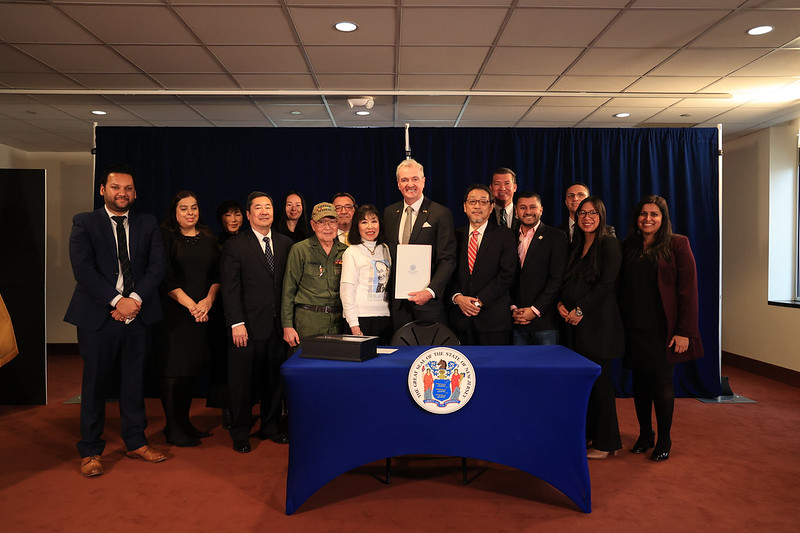(Mr. Takeshi Furumoto, pictured front row, fourth from left in military uniform.)
Takeshi Furumoto, one of the founding members of the Japan History Council of New York, was born in northern California’s Tule Lake War Relocation Center in 1944. He served in the Vietnam War and suffered from PTSD upon his return to the U.S., where he nevertheless established a successful career in the NY and NJ real estate business. After experiencing anti-Japanese discrimination in the late 1980s and early 1990s, he received a distinguished service medal from the State of New Jersey for his services in Vietnam, at which point he began to speak out about his experiences to the public.
It was January 2016 when Mr. Furumoto testified about his family’s experiences to the New York City Council, which led to the passage of the Fred Korematsu Day of Civil Liberties and the Constitution resolution in the City of New York in December 2017. Following this, Mr. Furumoto took the initiative to promote the same resolution in the Borough of Fort Lee, NJ, which successfully passed in January 2020.
He next turned towards work on this legislation at the state level in New Jersey in January 2021. Through his tireless efforts after testifying in several Committees, the resolution was passed and a historic signing of the Fred Korematsu Day of Civil Liberties and the Constitution resolution (AJR98) took place with Governor Murphy in Trenton on January 30, 2023. This made New Jersey the sixth state to designate January 30th of each year as a day of recognition and honor for Fred Korematsu’s legacy.
Fred T. Korematsu was an American civil rights activist. In 1942, at the age of 23, he became one of three men, along with Minoru Yasui and Gordon Hirabayashi, who refused to go to the government’s incarceration camps for Japanese Americans. After he was arrested and convicted of defying the government’s order, he appealed his case all the way to the U.S. Supreme Court. In 1944, a divided Supreme Court ruled against him, arguing that the incarceration was justified due to military necessity.
In 1983, with new evidence, a pro-bono legal team re-opened Korematsu’s 40-year-old case on the basis of government misconduct. On November 10, 1983, Korematsu’s conviction was overturned in a federal court in San Francisco (convictions for Yasui and Hirabayashi were similarly overturned in 1986 and 1987). In 1998, Korematsu received the Presidential Medal of Freedom, the nation’s highest civilian honor, from President Bill Clinton. And in 2018, the Supreme Court formally repudiated its 1944 decision.
After passage of the NJ resolution, Mr. Furumoto remarked, “Today, Jan. 30, 2023, is a great day for State of NJ – it is a great day for HUMAN KIND! To not only recognize the wrongs of the past, but by recognizing this through legislation, vows to not repeat it. As a survivor, by testifying and passing this bill, and getting unanimous vote of approval by the State Senate and Assembly, gives me a hope for future of America!”


